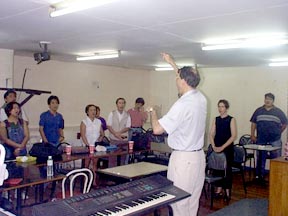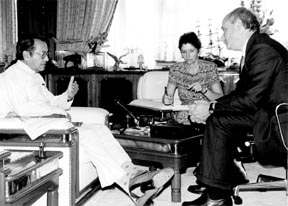
Home | Search | About | Fidelio | Economy | Strategy | Justice | Conferences | Join
Highlights | Calendar | Music | Books | Concerts | Links | Education | Health
What's New | LaRouche | Spanish Pages | Poetry | Maps
Dialogue of Cultures
Billington Tour Mobilizes for Eurasian
Land-Bridge, New Bretton Woods
June, 2001
 |
||
| Michael Billington (right) being interviewed on Philippine Televison |
In all of their meetings, the Billingtons found that the citizens of the Southeast Asian nations are totally disillusioned with the false promises of "globalization" under the International Monetary Fund (IMF), and are searching for ways to save their nations from the ravages of the unfolding global economic collapse.
However, there is still a persistent lingering belief—actually, wishful thinking—that the breakdown of the U.S. economy is a passing phenomenon, and that the failed policies of the globalization process will be overcome through the imminent recovery of the great U.S. import machine of the past decade. Using graphs and charts, the Billingtons demonstrated that the U.S. economy has been in a 30-year-long decline, living off imports cheapened by forced devaluation and other forms of looting from the developing nations, while cannibalizing its own economy by destroying the infrastructure necessary for industry and for the general welfare of the population.
Most members of the Association of Southeast Asian Nations (ASEAN) have watched with distress as the U.S. import markets collapsed over the past year, and have begun to conspire among themselves and with their Eurasian neighbors on plans to meet the crisis. Throughout the 1990s, the Anglo-American financial institutions cajoled the ASEAN nations to adopt an export-oriented policy, allowing their cheap labor to be used by mostly foreign-owned process industries to produce exports for the Group of Seven nations. While most of the world—including the ASEAN nations themselves—crowed about the "ASEAN Tigers" as the model for prosperity under globalization, LaRouche repeatedly warned that the hot-money, speculative economics of the "Tigers" would soon become easy prey for the speculators. The 1997-98 looting of the ASEAN economies by hedge-fund operative George Soros and his cohorts proved LaRouche right, while only Malaysia's Prime Minister Dr. Mahathir bin Mohamad was willing to acknowledge his mistake, and take sovereign measures (including selective currency controls and a fixed exchange rate) to protect the general welfare of his nation's population. The other major ASEAN nations, subjected to IMF-dictated conditionalities, suffered both economic collapse and social disruptions, intensified by the growing poverty rates.
Now, with the IMF-imposed policies exposed as a new form of colonial control and outright looting, the ASEAN nations have joined forces with their East Asian neighbors—China, Japan, and South Korea—to form the ASEAN-Plus-3, including the establishment of monetary swap agreements totaling upwards of $40 billion, as a means of defending against any renewed speculative attacks on their currencies, and developing plans for an Asian Monetary Fund, independent of the IMF. It was in this environment that EIR presented LaRouche's solutions to the global crisis.
While the Billington tour did not include Indonesia, because of the unfolding political crisis in that nation (see article this issue), the Billingtons did visit the other three leading economies of ASEAN: the Philippines, Thailand, and Malaysia. The visits were enhanced by the presence of two new institutions in the region: the Philippines LaRouche Society (PLS) and the Malaysia LaRouche Society (MLS). These organizations were formed by long-standing associates of LaRouche in these countries, and a growing number of new friends and supporters who have been motivated by LaRouche's ideas to join the fight to change the course of history, for their nation and for the world.
The Philippines
PLS members arranged presentations at seven leading universities, where the Billingtons addressed a total of nearly 1,500 students and faculty. Although they had been warned that the students were being fed a constant diet of "free-trade economics" and globalization dogma, they discovered that these youth—and their professors—were hungry for some understanding of the cause of the collapse, and for ideas which could help them save their economy and their nation. The idea of the "American System" of economics, based on the discoveries of G.W. Leibniz, the policies of Alexander Hamilton, and further developed by LaRouche, came as a revelation, being neither of the two systems (British free-trade economics or communist state control) presented in their textbooks.
They were fascinated by the EIR transparencies showing the Eurasian Land-Bridge, and discussions of the recent development of alliances among Russia, China, and other Eurasian nations (including news of the presentations by LaRouche before the Russian State Duma (lower House of Parliament, see EIR, July 6 and July 20, 2001). One economics professor at the Polytechnic University of the Philippines said after the presentation: "This is it! All along I have taught what is in the curriculum—David Ricardo, Adam Smith, Marx, and all that—but I was always trying to teach something else as well, that was based on a moral view of advancing mankind; but I didn't know what it was. Now I know! It's LaRouche!" Students lined up to ask how to join the LaRouche Society, and the professors arranged to stock their libraries with EIR publications.
The Philippines LaRouche Society had made its first intervention into the political situation a few months earlier, when the newly installed government of Gloria Macapagal-Arroyo, within days of her inauguration, rammed a bill through the Congress privatizing and deregulating the National Power Company, based on the same model as the California deregulation of energy. A dossier prepared by the PLS exposed the plan as a guaranteed disaster on the same scale as that of California. The dossier was hand-delivered to every member of the Senate. Although the bill was passed with only one dissenting vote, the role of the PLS will be clearly remembered as history bears out the truth of their warning.
Beside meetings with political leaders and economists, the PLS arranged for Mike Billington to appear on two leading television shows—one, the morning economic and stock market program, watched by the nation's elite; and the second, the most popular interview program, "Tell the People," with Julie Yap-Daza, shown live during evening prime time. On the economic show, the reporter planned a ten-minute spot, but went for nearly an hour, fascinated by the fact that what he was hearing proved that everything he had learned and all the prevailing conceptions had to be thrown out, to deal with the reality of the global crash. The show was broadcast twice over the following days.
On the interview show, the host brought on two of the nation's most prominent economic planners, Raul Concepcion and Dante Canlas, representing an industrial association and the nation's economic planning unit, respectively. Confronted with EIR's blunt description of the collapsing world financial system, and the new reality of the Eurasian Land-Bridge-based political and economic alliances to escape a new Dark Age, these "experts" were reduced to sputtering about the expected revival of the U.S. economy to save their own, and even urged greater export of their own population as "overseas contract workers," as the solution to their foreign exchange problems. Calls came in both during the show and long afterwards, wanting to know how to contact the LaRouche Society in Manila.
The growing membership of the PLS will be holding regular classes on the history of the great ideas which have driven mankind's develop
ment, while setting up a structure to prepare a regular publication, combining material from EIR, and articles prepared by the members on the developments within the Philippines and the region.

Michael Billington, shown here leading chorus in the Philippines
Michael Billington, a trained tenor and choir director with the Schiller Institute, also took the opportunity of this tour to work with the newly formed PLS chorus, teaching the principles of polyohony, bel canto singing (see music pages), and the science behind the need to return to the scientific, Verdi tuning of C=256HZ.
Malaysia
The situation in Malaysia is quite different than that of the Philippines. The poverty in the Philippines is pervasive and oppressive. Millions of squatters live in cardboard shacks along every railroad and canal, while huge, uncompleted office buildings stand like ghostly skeletons across the Manila skyline, testimony to the hot-money binge of speculation before the 1997 Asian crash. Kuala Lumpur, on the other hand, avoided the worst of the 1997-98 crisis through the protective measures of the Mahathir government. Nonetheless, the collapse of the U.S. and Japanese import markets threatens Malaysia with the same breakdown crisis as the rest of Asia. EIR has supported Malaysia's courageous sovereign defense against the IMF, and spread its policies and the speeches of Prime Minister Mahathir around the world in its pages. However, as is evident to most of Malaysia's leaders today, actions by individual nations in the face of the global crash today are simply inadequate to achieve the necessary new world economic order to replace the bankrupt IMF-based system.
The Malaysia LaRouche Society has emerged under the leadership of a young scholar who has studied LaRouche's ideas for the past seven years. The Billington's visit served to catalyze a working relationship between this group of young people and several leading journalists, statesmen, and businessmen who have also followed LaRouche's work over the past decade. Meeting together for the first time, the diverse groups are now formulating policies and plans for the dissemination of LaRouche's ideas in Malaysia and throughout Southeast Asia.
The political and economic leaders who met with the Billingtons were very direct about their relationship to EIR: While they value the analysis contained in EIR, especially in relation to developments within the United States and in regard to the IMF, they are stunned by the intensity of the attacks on LaRouche and EIR coming from the U.S. State Department and related institutions. Their nation has itself experienced isolation and demonization by the Anglo-American elite, as a result of its sovereign measures of defense against the IMF regime, and thus they deeply appreciate LaRouche's fortitude in standing up for principle over the past three decades, despite intense persecution and slander against him.

Dr. Mahathir Muhammad , PM of Malaysia, with EIR's Gail Billington and Dino Di Paoli, of the Schiller Institute, during a January 1999 interview.
The Malaysians were particularly interested in LaRouche's ideas concerning the creation of a new monetary system. Being deeply involved in the discussions among the ASEAN-Plus-3 on these same issues, the Malaysians are grappling with how to create a monetary system that will not be subject to the same speculative assault as the current, floating-exchange-rate system implemented by the Nixon Administration in 1971, when Nixon dismantled the Bretton Woods fixed-exchange-rate regime. Dr. Mahathir has recently proposed a special currency for trade purposes only, based neither on any one currency nor a basket of currencies, while speculation in currency values would be forbidden. The most fundamental question, however, was left undetermined, namely, how to assign a value to such a unit of account for trade purposes.
Here, LaRouche's concept of a basket of commodities (see Lyndon H. LaRouche, Jr., "Trade Without Currency," EIR, Aug. 4, 2000), based on a 20- to 25-year development perspective for the Land-Bridge and related Great Projects around the world, provides a basis for building a monetary system which services the real economy, rather than the current subservience of the real economy (and the general welfare) to the shareholders in the monetary system. There was great interest in the ministries and among the leading think-tanks in these ideas.
Thailand
In Thailand, there is not yet a LaRouche Society, but the new administration of Prime Minister Thaksin Shinawatra and his Deputy, Chavalit Yongchaiyudh, has moved Thailand away from the subservience to the IMF which has held the nation in a deep depression since the 1997 speculative destruction of its currency. The government is struggling to find ways to revive the economy, through developing stronger regional ties, and reducing the "export orientation" imposed by the IMF. Most important, Thaksin and Chavalit have solidified relations with Thailand's immediate neighbors, Cambodia and Myanmar, while taking a leading role in efforts to integrate ASEAN into the East Asian, South Asian, and Eurasian alliances (such as the Shanghai Cooperation Organization).
The Billingtons had the opportunity to meet with ministry officials who are involved in this crucial diplomacy, and, as in Malaysia, the Thai leaders were particularly interested in the connection between the Eurasian development plans and LaRouche's ideas for a New Bretton Woods monetary system.
Another project getting full support in the new government is the building of the Kra Canal, linking the Andaman Sea with the Gulf of Thailand. This is an idea long championed by LaRouche and EIR, including the sponsorship of conferences and special reports dating back to the 1980s, as one of several Great Projects necessary to restart the world economy. The plan is now back on the drawing boards, and further advanced than ever before, in part because the Thais have succeeded in getting China and others interested in the idea, joining with the Japanese (who have been involved for many years). EIR renewed its contacts with some of the people involved in this development.
ASEAN-Plus-3 in Hanoi
The July meetings of ASEAN and the ASEAN-Plus-3 Foreign Ministers in Hanoi proved to be another crucial step forward for the region, although time is very short. In the "Hanoi Plan for Action," the ASEAN nations dedicated themselves to driving forward with the Great Projects which have been designed over the past years, including the Mekong River Development Project, the Asian Railroad (linked to the Land-Bridge connecting Asia with Europe and Africa), and several "Triangles" (i.e., projects among adjoining nations), for regional infrastructure and natural resources development. Most important, Russian Foreign Minister Igor Ivanov, as a dialogue partner of the ASEAN-Plus-3, expressed Russia's strong support for the projects, and offered to become directly involved in their realization. These promising developments improve the potential that the ASEAN-Plus-3 will be prepared to act in creating a new Asian Monetary System when the crucial moment arrives, as it certainly will in the immediate weeks ahead.
For More Information:
Thank you for supporting the Schiller Institute.
Your membership and contributions enable us to publish FIDELIO Magazine, and to sponsor concerts, conferences, and other activities which represent critical interventions into the policy making and cultural life of the nation and the world.
Contributions and memberships are not tax-deductible.
schiller@schillerinstitute.org
The Schiller Institute
PO BOX 20244 Washington, DC 20041-0244
703-297-8368
Home | Search | About | Fidelio | Economy | Strategy | Justice | Conferences | Join
Highlights | Calendar | Music | Books | Concerts | Links | Education | Health
What's New | LaRouche | Spanish Pages | Poetry | Maps
Dialogue of Cultures
© Copyright Schiller Institute, Inc. 2001. All Rights Reserved.